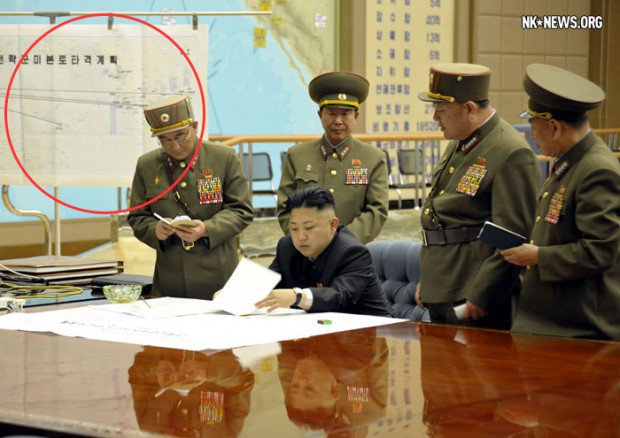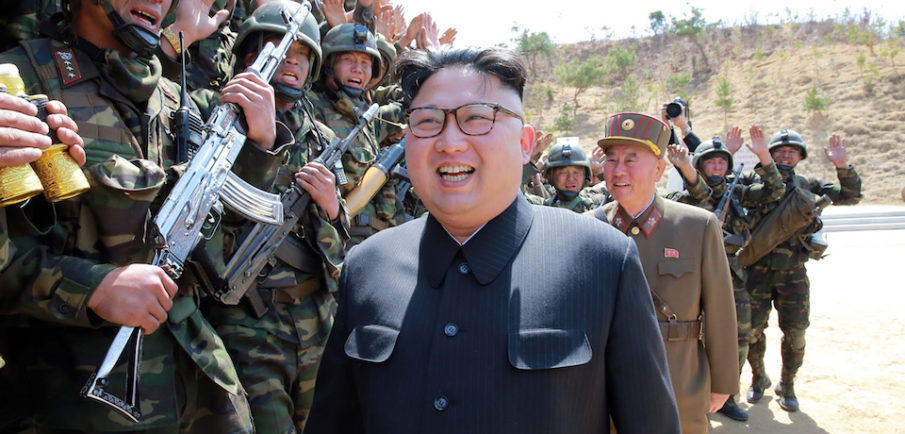The world watched with bated breath as North Korea’s delegation attended the 2018 Winter Olympics in South Korea, hoping that the seemingly innocuous olive branch extended by the divided Koreas might somehow lead to averting the war that’s been looming over their peninsula for months. Kim Jong Un’s aggressive pursuit of nuclear weapons and increasingly advanced ballistic missile platforms intended to deliver them, have recently propelled Kim’s aggressive rhetoric outside the boundaries of bluster, and into the the realm of unignorable, legitimate threats against America’s very existence.
Now, it would seem that the two leaders may actually meet, at a place and time that has yet to be determined, in order to discuss the future of the Korean peninsula.
With Trump in one corner and Kim in the other, it had appeared that neither leader was willing to back down, prompting concerns that Trump’s ‘fight fire with fire” approach might result in the world itself burning. Instead, however, it would appear that the recent slew of sanctions set in place by the Trump administration and United Nations may finally have been enough to force Kim to the negotiating table – and to the casual observer, this outcome may seem logical.
Sanctions are the primary weapon afforded to diplomats, and in a battle of financial attrition, it seemed clear that the United States would emerge on top. What hasn’t been clear, however, has been Kim’s willingness to accept such a public defeat.
From a political standpoint, neither Kim nor Trump can afford to look as though they’re backing down in the eyes of their domestic supporters. As the superior military and diplomatic force, backing off on Kim’s North Korean regime at this point would not only appear weak, but would undoubtedly be presented in the media as an acknowledgement that Trump’s aggressive tactics were in error – and regardless of where you stand politically, Trump publicly acknowledging a mistake seems unlikely.
In Kim’s case, the threat of the United States has served as a unifying element for Kim’s regime and populous – coloring the nation’s plight as a result of American imperialism and bullying. Although the internal politics of the United States and North Korea couldn’t be more different, in the precarious positions each leader finds themselves in politically, neither can afford to seem as though they’re backing off from their positions without compromising at least some political clout.
It would seem, however, that if Kim’s claimed willingness to discuss denuclearization are to be taken at face value, he may have found a way to paint the narrative while still giving the U.S. exactly what they wanted. In recent statements made by South Korea’s presidential Blue House, Kim has been quoted as claiming that he, like his father before him, always intended to reach a point of denuclearization, once they were certain that the nation didn’t need nuclear weapons to protect itself against American oppression.
Chairman Kim said that even denuclearization could be among the agenda items for talks between North Korea and the US,” a Blue House spokesman said,as reported by the South Korean news agency Yonhap. “What drew our attention, in particular, is that he made clear that achieving denuclearization is his father’s dying wish and that it has not been changed at all.”
Of course, to those that have followed Kim’s rhetoric prior to and throughout these escalating tensions, that claim seems wildly unsupportable, but just like foreign media interactions with Moscow, North Korea is well aware that being able to prove something to the public doesn’t matter nearly as much as simply being able to convince them.
If you need evidence to support the idea that Kim’s regime has long used the threat of a nuclear strike against the United States as a diplomatic bargaining chip, look no further than this 2013 photo released by North Korea’s state owned media outlet, KCNA. In it, a map is clearly visible in the background with the bold heading, “US Mainland Strike Plan.”

Already have an account? Sign In
Two ways to continue to read this article.
Subscribe
$1.99
every 4 weeks
- Unlimited access to all articles
- Support independent journalism
- Ad-free reading experience
Subscribe Now
Recurring Monthly. Cancel Anytime.

The accompanying piece read:
He finally signed the plan on technical preparations of strategic rockets, ordering them to be on standby to fire so that they may strike any time the U.S. mainland, its military bases in the operational theaters in the Pacific, including Hawaii and Guam, and those in south Korea,” a KCNA report in English said.
Again, in 2013, another official statement from Kim’s regime read, “Now that the US is set to light a fuse for a nuclear war, (our) revolutionary armed forces… will exercise the right to a pre-emptive nuclear attack to destroy the strongholds of the aggressors.”
“The moment of explosion is approaching fast,” the statement read, warning that war could break out “today or tomorrow.”
Now, however, Kim’s claims regarding his emphasis on nuclear weapons portray him as the reluctant defender of his nation’s sovereignty, seeing the development and use of nuclear weapons as a necessary evil in the face of America’s Pacific presence.
The North side clearly affirmed its commitment to the denuclearization of the Korean Peninsula and said it would have no reason to possess nuclear weapons should the safety of its regime be guaranteed and military threats against North Korea removed,” Chung Eui Yong, the director of South Korea’s National Security Office said after attending a recent meeting with North Korean officials.
Whether or not Kim Jong Un is actually willing to relinquish his nuclear arsenal in a verifiable way remains yet to be seen, but one thing is clear: Kim’s regime is already hard at work managing the way the world perceives any such change, and it’s likely that his narrative will receive support from China and Russia, who both also have a vested interest in destabilizing America’s diplomatic foothold in the region.
One might argue that painting America as the bad guy is worth avoiding what would undoubtedly be a terrible and tragic war, but it is important to remember that geopolitics, like chess, is often about misdirection. When your opponent gives up a pawn, it’s rarely out of the goodness of their heart – it’s because there’s a larger play afoot.
Image courtesy of North Korea’s KCNA











COMMENTS